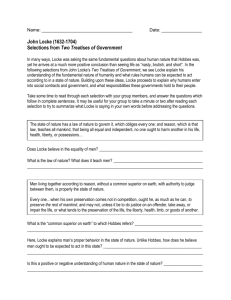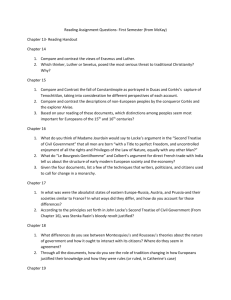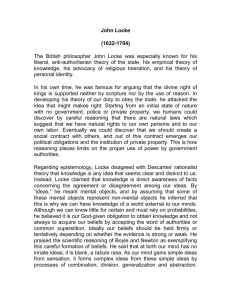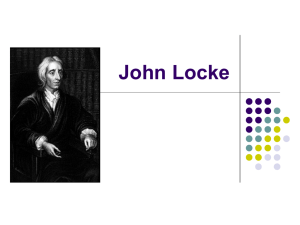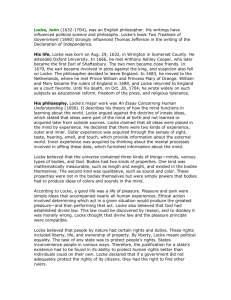Concepts and ideas of John Locke successfully exist in modern
advertisement
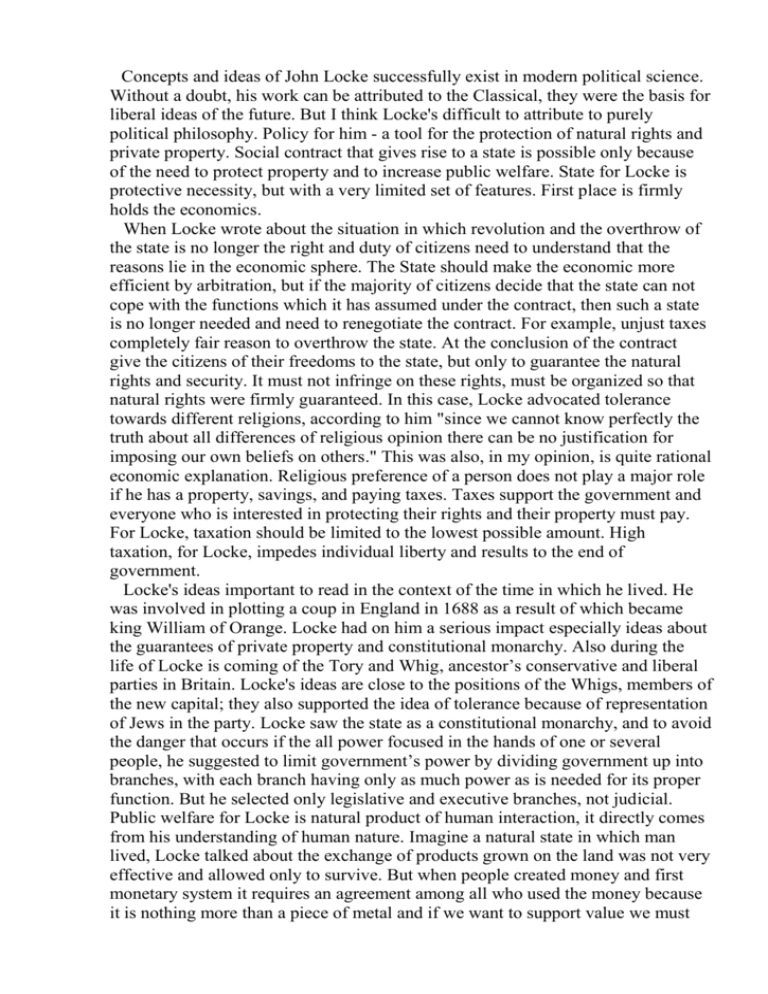
Concepts and ideas of John Locke successfully exist in modern political science. Without a doubt, his work can be attributed to the Classical, they were the basis for liberal ideas of the future. But I think Locke's difficult to attribute to purely political philosophy. Policy for him - a tool for the protection of natural rights and private property. Social contract that gives rise to a state is possible only because of the need to protect property and to increase public welfare. State for Locke is protective necessity, but with a very limited set of features. First place is firmly holds the economics. When Locke wrote about the situation in which revolution and the overthrow of the state is no longer the right and duty of citizens need to understand that the reasons lie in the economic sphere. The State should make the economic more efficient by arbitration, but if the majority of citizens decide that the state can not cope with the functions which it has assumed under the contract, then such a state is no longer needed and need to renegotiate the contract. For example, unjust taxes completely fair reason to overthrow the state. At the conclusion of the contract give the citizens of their freedoms to the state, but only to guarantee the natural rights and security. It must not infringe on these rights, must be organized so that natural rights were firmly guaranteed. In this case, Locke advocated tolerance towards different religions, according to him "since we cannot know perfectly the truth about all differences of religious opinion there can be no justification for imposing our own beliefs on others." This was also, in my opinion, is quite rational economic explanation. Religious preference of a person does not play a major role if he has a property, savings, and paying taxes. Taxes support the government and everyone who is interested in protecting their rights and their property must pay. For Locke, taxation should be limited to the lowest possible amount. High taxation, for Locke, impedes individual liberty and results to the end of government. Locke's ideas important to read in the context of the time in which he lived. He was involved in plotting a coup in England in 1688 as a result of which became king William of Orange. Locke had on him a serious impact especially ideas about the guarantees of private property and constitutional monarchy. Also during the life of Locke is coming of the Tory and Whig, ancestor’s conservative and liberal parties in Britain. Locke's ideas are close to the positions of the Whigs, members of the new capital; they also supported the idea of tolerance because of representation of Jews in the party. Locke saw the state as a constitutional monarchy, and to avoid the danger that occurs if the all power focused in the hands of one or several people, he suggested to limit government’s power by dividing government up into branches, with each branch having only as much power as is needed for its proper function. But he selected only legislative and executive branches, not judicial. Public welfare for Locke is natural product of human interaction, it directly comes from his understanding of human nature. Imagine a natural state in which man lived, Locke talked about the exchange of products grown on the land was not very effective and allowed only to survive. But when people created money and first monetary system it requires an agreement among all who used the money because it is nothing more than a piece of metal and if we want to support value we must produce goods. The market does not need any regulation, except taxes, and traders will determine value of money by themselves. That idea close to free market concepts, “invisible hand of market”, something like that. Money as a universal equalizer prevented problems of natural products decaying and helped to save its value for barter. And money plays a major role in social contract between people and state. In state of nature people had their own property, but only property is not enough for negotiation of social contract. In the state of nature people also have private property, according to Locke this is due to the nature of ownership, but the conclusion of the social contract is a direct consequence of the emergence of the monetary system. Public welfare linked with money, without it is only questions of surviving. There is a problem because personal appropriation of natural resources can continue indefinitely, Locke held, so long as there is "enough, and as good" left for others with the gumption to do the same. With the introduction of a monetary system that makes it possible to store up value in excess of what the individual can responsibly enjoy. The fundamental principle still applies: labour is the ultimate source of all economic value. Some people become richer than others, there are many reasons of it, for example: bad weather for cultivating in one region and good in another. Inequality becomes more noticeable. Locke attempts to rationalize the right of men having more goods and money than others but failed. If no man should appropriate more than he can use and beyond this share is for others, what right does man have to massive property when others are starving and have none? Of course people can work harder but for working they need land and what should they do, if all land has been divided? Locke gave a simple solution for it, if all the land is already divided, man can always go to empty territory and occupy it in his place. In this case, Locke did not consider living in those lands aborigines as land owners, because they had no money and they did not use the land as it was familiar to Europeans, and so he did not consider their rightful owners. International legal doctrine called “Terra nullius” told: if land was terra nullius then the colonial power could legitimately invade and take possession of the land for its own use. Terra nullius also translated as “no man’s land” so it means that Indigenous people who lived on these territories, in Europeans mind, were not humans. This problem is not just Locke; it is problem of humanity criteria for that time. XVII century is a time when slavery was a common thing and when people told about human rights they were referring to white men, with property and paying taxes. Will still be many years before people think about equal rights for all people, but in order to secure these rights in international agreements need bloodiest war. But what about Locke and Colonial project? Colonialism for Locke is the solution of economic problems and a new chance for all those Europeans who wanted to become richer. He wrote about native Americans: “thus in the beginning all the World was America…”. Their societies had no money and no social contract in the familiar look for Europeans but concept: “our bodies and their movements are our own, whenever we use our own effort to improve the natural world the resulting products belong to us as well.” becomes dual-edged blade. In the one hand, aborigines were not entitled to be regarded as having any claim to their territories because for Locke they are not a society, but in other hand they improve natural world in their own ways and traditions, so they would be a rightful owners of the land. We just need to expand the criteria for humanity and not to deny the rights of peoples who are different from us. And in this case the ideas of Locke are suitable for all, and even serve as a justification for the universality of the natural rights for each.




